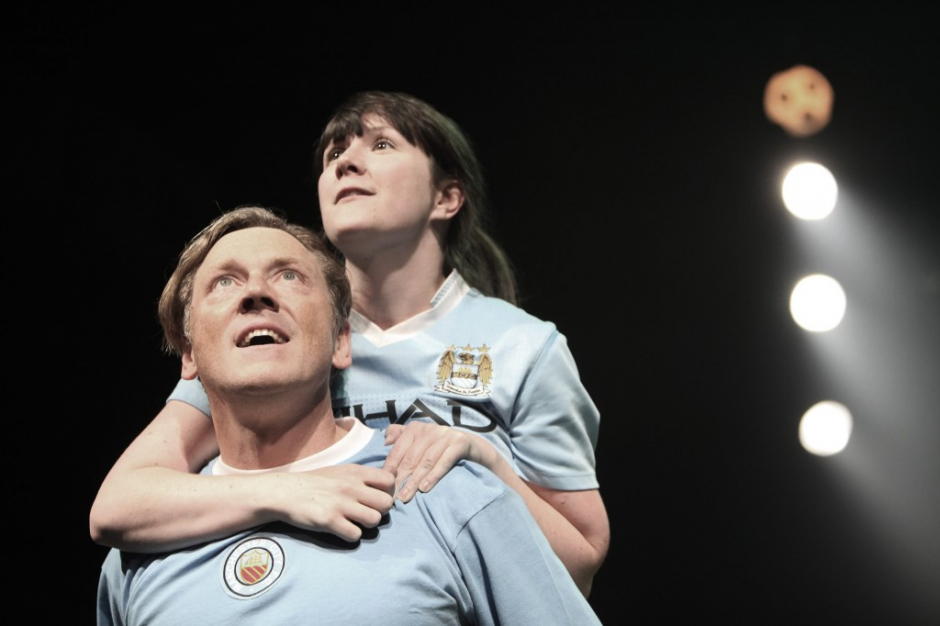By Far the Greatest Team – The Lowry
Mixing football and theatre is an interesting but risky move. On paper, the high drama of both forms of entertainment should lend themselves to an exciting combination, the opportunity to bring two of our nation’s favourite pastimes together to create something original and hopefully at least half as enthralling as either one of them can be on their own. That said, and if we were to be stereotypical, they are two hobbies that are often attract almost wildly differing crowds. Would the essence of football get lost in the attempts to create compelling narratives? Or would theatrical ambition be dampened down to appeal to the masses?
It has to be said that, when first walking into The Lowry’s Quays Theatre, it did seem like the latter may be the case. The usual set-up of the room had been interrupted by the presence of a small AstroTurf pitch and a player’s tunnel leading from backstage to front. To say this looked a little cheesy would be an understatement, but any concerns that the tackiness might extend into the four short plays that made up By Far the Greatest Team were expelled in a matter of seconds.
Ian Kershaw’s We’re Not Really Here was the first of the four shorts. As Man City supporting Sam (David Judge) burst onto the pitch clutching a cricket bat and singing a song that would prick the nerves of any Man United fan, we knew this wasn’t going to be any paint by numbers football love in. The song, which aims abuse at those who died in the tragic Munich Disaster, is well known and much derided among most football fans. Nearly every team will have some such chant – one that splits the fans, hated by anyone who doesn’t want their beloved team and sport to be dragged through the mud, adored by those who like to use their football trips as a way to stir up trouble and get involved in fights. It’s a massive issue in the sport, and part of the reason that football still struggles to clean up its act. After pulling people in with the promise of football related plays, Monkeywood Theatre, Ian Kershaw, and The Lowry were very courageous to use the first half hour to make a stand against such chants. And as the football-shirted hooligan, David Judge put in the performance of the night.
After such a heavy-hitting opener, Lindsay Williams’s Stretford End opted for a lighter touch. With each play featuring either one or both of Manchester’s most famous teams, this second performance started in the Stretford End of Old Trafford on the final day of Alex Ferguson’s managerial reign. Beginning with two friends debating the best moment of the manager’s career, the play took an interesting turn when Sal (Francesca Waite) arrived on the scene. As a love triangle emerged between the three protagonists, we were left questioning just where football lies on the list of people’s priorities, and whether it should truly belong as high up on the list as it does for many. After such a powerful first play, there was a risk that this one could pale in comparison. But there was a lot to love here, too – especially for anyone who knows enough about football to get the in-jokes.
After a half time which included pork pies and beer alongside the usual wine and nibbles, we were back balancing relationships and football in The Good, The Bad, and the Giggsy. Although the main relationship under the microscope was the one between City loving Eileen (Samantha Siddall) and United obsessed Albion (Andrew Sheridan), we also had to consider the ways in which both members of this now separated couple related to Giggsy, the pet Welsh terrier they used to share. With less direct relation to football than any of the other plays, perhaps the highlights of this particular short existed within the none-too-subtle digs at the sexual exploits of the real Ryan Giggs. That said, there were also two great performances by the stars, most notably by Siddall, who you may know as Mandy Maguire from Shameless. It was a touching and slightly mad piece of theatre which maybe only seems slightly less memorable because of the quality of the rest of the bill.
Rivalling the night’s opening drama for the play of the day was the final piece, a narrative that takes place on the day when Sergio Aguero won the Premier League for Man City in the closing seconds of stoppage time. More than likely the most uncomfortable watch for any United fans in the room, the main drive behind this last story was Abi’s (Sarah McDonald Hughes) attempt to mend her relationship with her father Gary (Mark Jordan). Despite his living around the corner, Abi hasn’t seen her father in years. When her brother calls to say he is concerned for their father’s mental health, she agrees to take him to the match. While it may seem almost too obvious that football is going to be a feature in restoring their once close relationship, it doesn’t really damage the telling of the tale. Both actors handle the mixture of humour and emotion with aplomb.
And so a night that could have been terribly cheesy actually managed to put together four plays of a very high quality. There will probably be as many arguments over which was the best play as there is about a penalty decision in a local derby, but in the end that doesn’t really matter. They were all entertaining. Monkeywood Theatre put on a show that might even be worth missing the Champions League for.
Fran Slater

